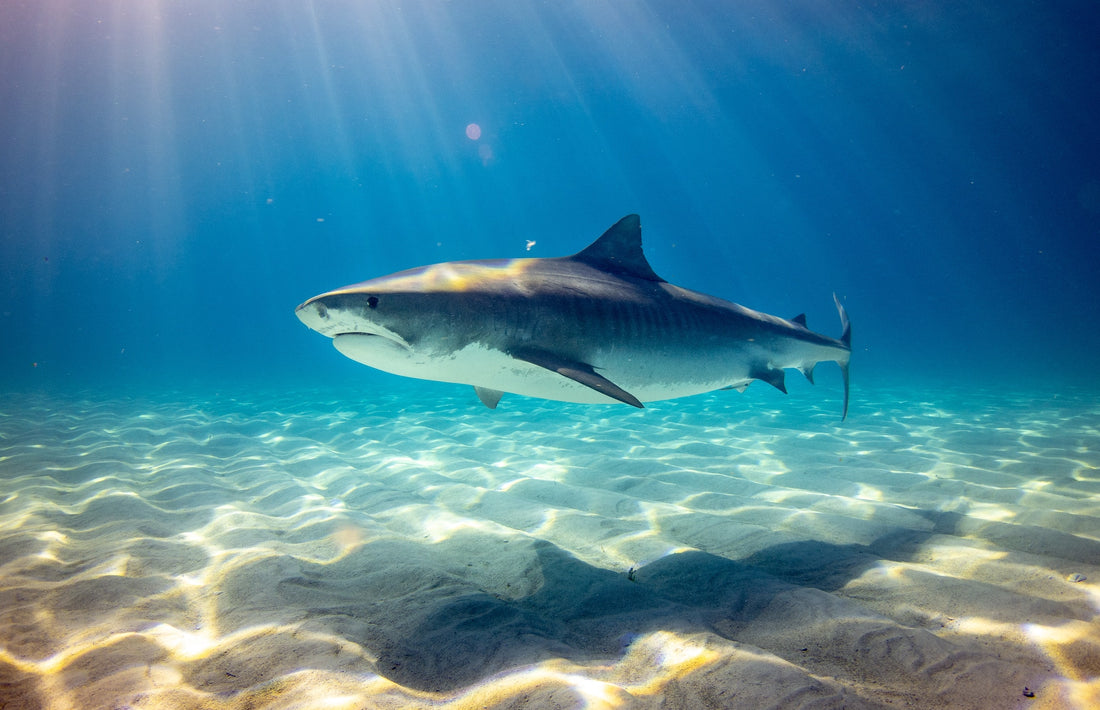Despite an intimidating appearance and fearsome reputation, Sharks play an integral role in maintaining the ocean's health. As top predators, sharks regulate the species below them in the food chain, which ensures diversity and maintains the balance of the ecosystem. Yet numerous myths surrounding these creatures may lead to misguided fears. At Grateful Diver, we believe that education is the first step towards respectful and safe interactions underwater. Let's debunk 5 common shark myths to better understand their behavior and characteristics.
Myth #1: Sharks Are Mindless Killing Machines

Sharks are often portrayed as relentless predators. But their behaviors are complex and calculated (in contrast to sensationalized images often glamorized by the media). Integral to the marine ecosystem balance, sharks play crucial roles in regulating prey populations and ensuring healthy oceanic environments. In fact, most sharks feed on weak, old, or sick fish, ensuring that fish populations remain healthy and in equilibrium. By controlling the populations of their prey, sharks prevent a single species from monopolizing resources, thereby promoting species diversity.
Grateful Diver Tip: Let sharks come to you; if they're swimming calmly, they're not a threat.
Myth #2: All Sharks Are Dangerous To Humans

Sharks vastly predate humans, with a lineage dating back 450 million years. Of over 500 diverse shark species in our oceans today, only a handful have ever been linked to incidents with humans. These ancient predators primarily evolved to feast on fish and marine mammals, not us. On the rare occasions when encounters do occur, it's often a case of mistaken identity, where a curious shark might misinterpret a splashing surfer for prey and investigate with a bite.
Grateful Diver Tip: Educate yourself about the specific shark species you might encounter during a dive.
Myth #3: Sharks Can Smell A Drop Of Blood From Miles Away

While it's true that sharks possess an impressive olfactory system, the belief that they can detect a single drop of blood from a mile away is a stretch. Sharks do have a keen sense of smell, which aids in their hunting methods, but the actual distance at which they can sense prey largely hinges on external environmental factors. Elements like the speed and direction of ocean currents play significant roles in transporting odors, making the "miles away" claim more myth than reality.
Grateful Diver Tip: Don't dive with open wounds; sharks have a strong sense of smell.
Myth #4: Shark Attacks Are On The Rise Because Of Increasing Shark Populations

Contrary to popular belief, shark populations are experiencing a decline rather than an increase. A global assessment conducted by scientists and published by Nature found that oceanic shark and ray populations have declined by 71% since 1970. This decline is largely attributed to overfishing. Given this backdrop, the notion that shark attacks are on the rise due to expanding shark populations is unfounded.
In fact, data from 2022 reveals a decline in shark attacks, with only 57 unprovoked bites recorded worldwide. To put this in perspective, the chances of being attacked and killed by a shark are 1 in 3.75 million, according to the International Wildlife Museum. You have a better chance of winning gold in the Olympics (1 in 662,000) or getting struck by lightning in the United States (1 in 15,300 ) than getting killed by a shark. Our focus should be on understanding the current state of affairs and promoting shark conservation to safeguard these incredible creatures.
Grateful Diver Tip: Over 100 million sharks are killed by humans every year. Join groups like Oceana, Shark Angels, Reef Relief, or PADI AWARE Foundation to help save sharks and our oceans.
Myth #5: If A Shark Comes Close, The Best Thing To Do Is Play Dead

The idea of playing dead during a close shark encounter is a widely held misconception that doesn't align with best practices for diver safety. When faced with a nearby shark, remember that these creatures are more curious than aggressive.
To ensure a safe interaction, understanding shark behavior and knowing how to respond is crucial. Instead of playing dead, divers should maintain a vertical position, ensuring they can always see the shark. It's best to exhibit calm and deliberate movements, gently backing away without sudden gestures or panic.
Grateful Diver Tip: Maintain a vertical position, keep your eyes on the shark, and slowly back away without making rapid movements.

As divers, anglers, ocean lovers, and everything in between, it’s important to understand and respect all marine life, especially the often misunderstood shark. By debunking myths and sharing accurate knowledge, we not only ensure safer dives but also contribute to the well-being of our marine ecosystems.
As you dive into your next ocean adventure, make sure you’re fitted with the best gear and apparel. Browse Grateful Diver UV shirts, neck gaiters, or hats for protection from the elements. A portion of every purchase benefits Reef Relief, which helps maintain healthy and sustainable habitats for marine life.

